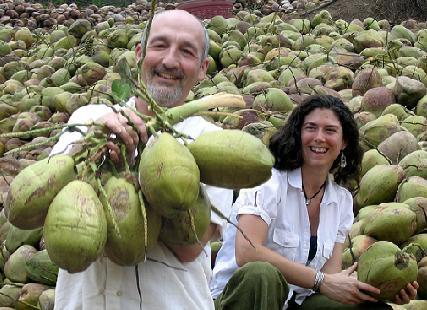
Imitating nature's way of letting nothing to go to waste, materials researchers-turned-entrepreneurs are using the humble coconut husk to manufacture an expanding variety of useful, environmentally friendly products.
While husks are often discarded, they can be put to a variety of uses, such as binder-less particle board, sustainable packing material, automotive trunk liners and electric car battery pack covers. Additional applications include farm erosion netting, activated charcoal filters, potting materials and wall planters.
Also known as coir, the history of using coconut husks to manufacture a variety of natural bio-products goes back thousands of years. Today, it's progressing hand-in-hand with an inclusive model of international development centered on sustainable local market and business development, job creation and the opening up of new opportunities that could raise the living standards of millions of families living in the tropics.
Young research-driven companies in Texas, such as Essentium Materials in College Station, embody social-enterprise and triple-bottom-line values in which ethics and justice underpin environmentally, socially and economically sustainable product and business development.
An abundant, renewable resources
An abundant, renewable resource that thrives across a 2,800-mile-wide tropical zone, an estimated 50 billion coconuts are harvested annually across the tropics. Ninety-six percent are harvested by more than 10 million poor, small-scale coconut farmers subsisting on less than $500 per year, highlighted Baylor University's Dr. Walter L. Bradley and Stanton Greer in a research brief.
Bradley and Greer believe that by employing local, village-scale technology and labor, the value created by processing coconuts' constituent parts can be raised from less than 10 cents to more than $1 per coconut, “multiplying the income of 10 million coconut farmers worldwide from $500 per year to $5,000 per year.”
Lacking products and markets in which to sell, much of the value inherent in coconuts is being wasted, Bradley and Greer believe. The value of products produced from coconuts totaled just 16 cents per coconut, a total of only $3 billion in 2006, they note, with over 95 percent of that derived from coconut oil.
In addition to coconut meat, which is processed to produce coconut oil and a variety of other useful by-products that are sold locally and internationally, coconut husks “can be processed locally to create value, providing jobs and income to communities in under-developed, tropical nations worldwide,” they wrote.
Coconut husks as a substitute for synthetic fibers
Researching and developing ways of using fiber extracted from coconut husks to produce higher-value products has turned into more than a growing business for Elisa Teipel, her husband Blake Teipel and Matt Kirby. In addition to producing environmentally friendly products, the three founders of Essentium Materials see their business venture as a means of lifting small coconut farmers out of poverty.
As explained in a National Science Foundation profile, “Today their new company, the College Station, Texas-based Essentium Materials, is turning out automotive trunk liners, load floors (battery pack covers in electric cars), and living wall planters, among other things, with technology they developed that produces a composite material made of coconut husks combined with recycled plastics.”
The resulting coconut husk-based composite material, NSF highlights, “is greener and cost neutral, as well as stronger and stiffer, than the traditional all-synthetic plastic fibers, and with neutral anti-microbial properties due to a high lignin content.”
Another big benefit could be realized if coconut husk fibers were used instead of synthetic polyester fibers: an annual reduction in petroleum consumption of 2 to 4 million barrels and an associated reduction in carbon dioxide emissions of 450,000 tons each year.
As Teipel said, "The coolest part is seeing something that was once just waste become a new resource ... Also, it is benefitting both the environment and the communities in developing nations where the coconuts are grown."
*Image credits: 1) AmazingData.com; 2) LocalForage.com

An experienced, independent journalist, editor and researcher, Andrew has crisscrossed the globe while reporting on sustainability, corporate social responsibility, social and environmental entrepreneurship, renewable energy, energy efficiency and clean technology. He studied geology at CU, Boulder, has an MBA in finance from Pace University, and completed a certificate program in international governance for biodiversity at UN University in Japan.














